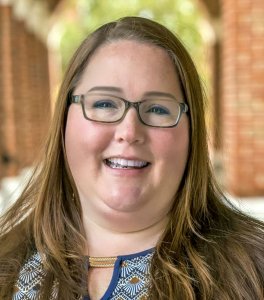It's Inauguration Day!
Congratulations, Matt vandenBerg, OWU's 17th President!
View details for Inauguration Day and stream the event live.
Congratulations, Matt vandenBerg, OWU's 17th President!
View details for Inauguration Day and stream the event live.

September 9, 2020 | By Cole Hatcher

DELAWARE, Ohio – Rachel Bitecofer, Ph.D., elections researcher and public policy expert, will discuss “Fear and Loathing in the 2020 Election: The Negative Partisanship Forecasting Model” during an Ohio Wesleyan University virtual lecture at 7 p.m. Sept. 16.
Bitecofer’s online presentation represents Ohio Wesleyan’s 2020 Benjamin F. Marsh Lecture Series on Public Affairs. Registration is required for the Zoom presentation by visiting owu.edu/MarshLecture.
The senior fellow, elections, for the Washington, D.C.-based Niskanen Center, Bitecofer says negative partisanship is fueling the American people and influencing the 2020 election. Negative partisanship is the idea that voters form their political opinions based on disliking the other party.
As part of her analysis, Bitecofer created an election-forecasting model that predicted the 2018 midterms five months before they occurred – far ahead of other forecasting models. In it, she argued that American elections have become increasingly nationalized and highly predictable with partisanship serving as an identity-based, dominant vote determinant for all but a small portion of Americans.
In a blog post expanding this model to 2020, Bitecofer states:
“Barring a shock to the system, Democrats recapture the presidency. The leaking of the Trump campaign’s internal polling has somewhat softened the blow of this forecast, as that polling reaffirms what my model already knew: Trump’s 2016 path to the White House, which was the political equivalent of getting dealt a Royal Flush in poker, is probably not replicable in 2020 with an agitated Democratic electorate.”
Bitecofer’s research has been featured in media outlets such as The New York Times, The Washington Post, USA Today, and NPR, and she is a contracted commentator on CBC Radio. Her book, “The Unprecedented 2016 Presidential Election,” explains the 2016 election “through a strategic focus … both suitable for undergraduate coursework and for consumption by a general, non-academic audience.”
Bitecofer earned her bachelor’s degree in political science from the University of Oregon and her doctorate in political science from the University of Georgia. At the Niskanen Center, she conducts election analysis and election forecasting research on the presidential and congressional elections, and also conducts pro-democracy research.
Ohio Wesleyan’s Marsh Lecture series, begun in 2001, is coordinated by Ohio Wesleyan’s Department of Politics and Government and the Arneson Institute for Practical Politics and Public Affairs. During his lifetime, Marsh, a 1950 OWU graduate and attorney, held numerous political posts at local, state, and national levels, and served as registration supervisor and adjudicator for the U.S. Department of State to the Organization and Cooperation in Europe (OSCE) and as an election supervisor in Bosnia and Herzegovina. Learn more at owu.edu/politics.
Founded in 1842, Ohio Wesleyan University is one of the nation’s premier liberal arts universities. Located in Delaware, Ohio, the private university offers more than 90 undergraduate majors and competes in 24 NCAA Division III varsity sports. Through Ohio Wesleyan’s signature OWU Connection program, students integrate knowledge across disciplines, build a diverse and global perspective, and apply their knowledge in real-world settings. Ohio Wesleyan is featured in the book “Colleges That Change Lives” and included in the U.S. News & World Report and Princeton Review “best colleges” lists. Learn more at owu.edu.